Catching up - improving council tax arrears collection
 The number of council tax arrears issues seen by Citizens Advice has risen by a third (32%) over the last three years, at a time when the number of debt queries from consumer credit products such as loans and credit cards has been falling.
The number of council tax arrears issues seen by Citizens Advice has risen by a third (32%) over the last three years, at a time when the number of debt queries from consumer credit products such as loans and credit cards has been falling.
Catching up: improving council tax arrears collection [ 0.67 mb] - based on a survey of 1,100 Citizens Advice clients in England and depth interviews with advisers and people - examines the reasons behind this, how people tried to tackle their arrears, and how councils dealt with them when they fell behind.
It also provides examples of good practice and recommends ways councils could improve council tax collection, such as using data they already hold to identify vulnerable people and offer them an affordable payment plan before taking them to court and using bailiffs.
-
The main reason people fell behind with Council Tax was ‘a general lack of money to cover all bills’ (55%), followed by a drop in wages, then cuts to benefits or tax credits
-
The most common way people tried to deal with their arrears was to cut back on essentials such as food or heating (58%), followed by skipping payments on other bills (55%)
-
Most people (69%) said the council’s actions had made it harder to clear their arrears. Most (71%) had seen extra charges added to their bill, and half (48%) had been visited by a bailiff.
Current council tax collections processes often do little to prompt those in difficulty to seek help to tackle their debts - in many cases, a court order is obtained and the debt is passed to a bailiff too quickly, before efforts are made to agree an affordable repayment plan.
The report recommends a range of practical improvements to council tax collections, including:
-
Improved reminder letters and phone calls to encourage people to seek debt advice and ensure they are claiming any benefits or discounts they’re entitled to;
-
Avoiding the practice of cancelling instalment plans and asking for the rest of the year’s council tax in a lump sum when payments are missed
-
Avoiding bailiff use wherever possible and publicising local hardship funds to ensure those who could be eligible for remission of their arrears can apply.

